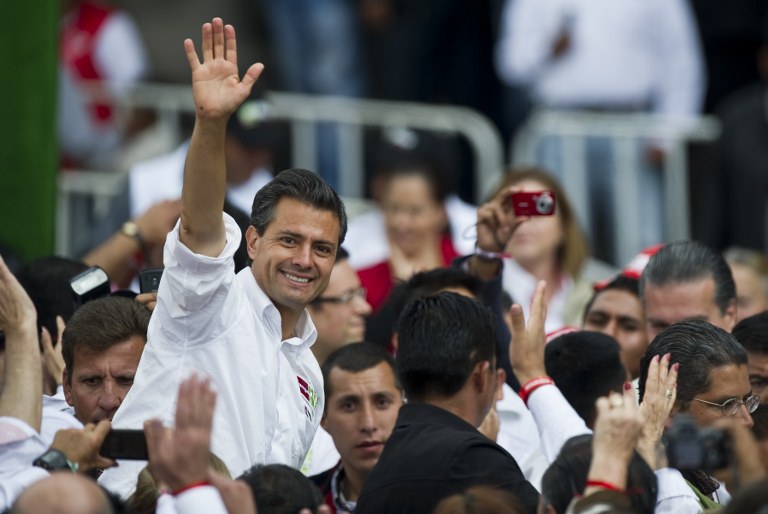SUMMARY
This is AI generated summarization, which may have errors. For context, always refer to the full article.

MEXICO CITY, Mexico – Voters in Mexico, tired of rampant drug violence and 12 years of conservative leaders, go to the polls Sunday, July 1, to elect a new president — likely the candidate from the party that ruled for decades.
Nearly 80 million Mexicans are eligible to cast ballots in Sunday’s vote.
Polls open at 1300 GMT, and the first exit surveys will be made public when the last polls close at 0100 GMT Monday.
Election officials are expected to announce the first official results at 0445 GMT Monday. Final results are expected later in the week.
Pre-vote surveys show Enrique Peña Nieto — the well-coiffed, dapper-dressed candidate for the Institutional Revolutionary Party (PRI) — heading for a slam-dunk victory in the country of 112 million people.
“My priority will be to battle the poverty in our country at its roots,” Peña Nieto, a former state governor, told a cheering crowd at his final campaign stop Wednesday in Toluca, just west of Mexico City.
Hundreds of party candidates are likely to benefit from Peña Nieto’s predicted electoral tidal wave.
The candidate did not mention the violence plaguing the country, which has left more than 50,000 dead since outgoing President Felipe Calderon deployed the military to crack down on drug cartels in late 2006.
Andres Manuel Lopez Obrador from the leftist Party of the Democratic Revolution (PRD) still believes he can pull an upset by attracting voters who want to prevent the PRI from returning to power.
For decades synonymous with the Mexican state, the PRI governed through a mix of lavish patronage and selective repression, and by isolating political foes through rigged elections and skewed media coverage.
Peru’s Mario Vargas Llosa once dubbed it “the perfect dictatorship.”
Lopez Obrador would know: he is one of the prominent left-wing PRI members who split with the party after the controversial 1988 election and co-founded the PRD.
The PRI was in power for 71 years until 2000, when Vicente Fox from the conservative National Action Party was elected president. Fox was followed by Calderon, a fellow PAN member.
Lopez Obrador, often referred to by his initials AMLO, lost the 2006 presidential vote by less than one percentage point.
Outraged at perceived voter fraud, he closed down Mexico City with street protests for more than a month.
This year a kinder, gentler Lopez Obrador, now 58, talked about leading a “republic of love” on the campaign trail. Critics laughed, but in the last weeks support among voters for AMLO began to rise.
In order to win, Lopez Obrador will need to peel votes away from PAN candidate Josefina Vazquez Mota — an unlikely task, given their divergent political philosophies.
Vazquez Mota, 51, is the first female presidential candidate of a major Mexican party, but her campaign failed to excite voters, in part because she lacked bold proposals and in part due to her association with the unpopular Calderon, who by law cannot run for re-election.
It is hard for Peña Nieto, 45, not to shine with his glamorous TV star wife on his arm and three gorgeous children in tow when compared to his older, lackluster rivals.
Peña Nieto is a former governor of the densely populated state of Mexico. He is married to Angelica Rivera, star of the hit telenovela “Distilled Love,” and ran a model campaign with tightly-staged photo ops and slick ads.
Neither his bland performance in two televised presidential debates, nor a student movement prematurely dubbed the “Mexican Spring,” nor leaked documents alleging that he paid for years of glowing media coverage dented Peña Nieto’s lead in the polls.
Even though security is a top concern in Mexico — where in vast regions kidnappings are rampant, drug hits are common and gang warfare has left a grisly trail of dismembered bodies — the candidates have only proposed slight modifications to Calderon’s disliked policies.
On Sunday, the Mexican army said it will send out extra patrols in some dangerous parts of the country to provide safety for voters, the defense ministry said.
Security minister Alejando Poire said there will be “visible federal presence” in “zones where there is a high rate of criminality.” – Carlos Hamann, Agence France-Presse
Add a comment
How does this make you feel?
There are no comments yet. Add your comment to start the conversation.